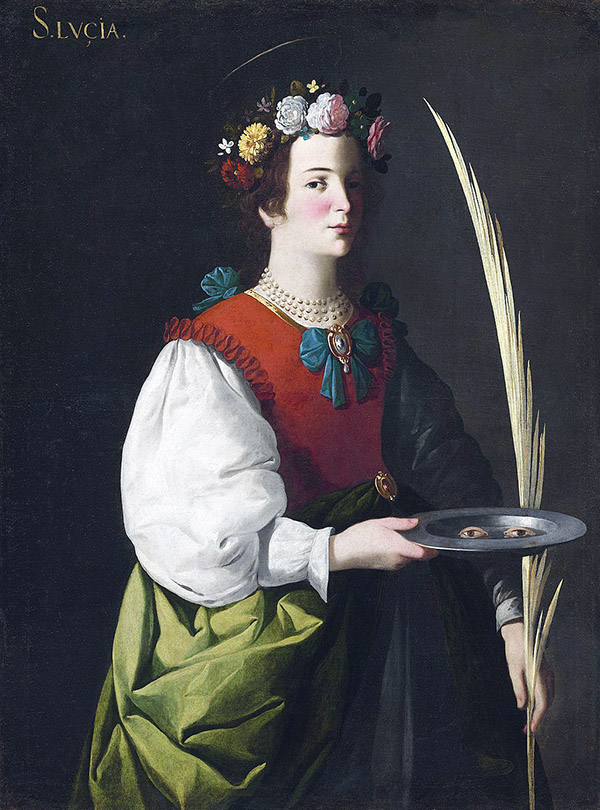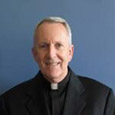The Single Vocation?
- MSGR. CHARLES FINK
A friend of mine was a bit put off recently by a highly credentialed Catholic layman who declared that there were only two vocations open to Catholics: marriage or some form of religious life.
 Saint Lucy by Francisco de Zurbarán National Gallery of Art, CC0, via Wikimedia Commons.
Saint Lucy by Francisco de Zurbarán National Gallery of Art, CC0, via Wikimedia Commons.
The single life, he averred, is a failed vocation. I can't tell you how many people of all ages, particularly those under forty, have shared with me their feeling that, in the eyes of the Church, they, being single, are second-class citizens or, as the aforementioned self-assured Catholic layman put it, failed vocations.
Let me suggest that we, as a Church, should not be communicating this attitude, especially given the miserable, secular-materialist society in which we live, making the prospect of finding a suitable partner in marriage a daunting enterprise for so many young, devout Catholic men and women. The rejoinder that all such should seek out religious life as an alternative strikes me as utterly, even obnoxiously, unrealistic and misguided.
Few in any society will be called to the priesthood and religious life. The suggestion that all non-marrieds should enter religious life or be deemed failures is absurd. In St. Paul's first Letter to the Corinthians (the second reading for the Fourth Sunday in Ordinary Time), he recommends the single life for men and women as being more conducive than the married state to preoccupation with the things of God.
Granted that his view laid the groundwork for future religious life—the desert fathers, monks, consecrated virgins, and so on—none of these existed in the earliest Church. It seems that Paul didn't think the single life per se was all that flawed.
I have known and been told of chronically ill single people who, unable to perform many ordinary tasks the rest of us take for granted, offer up their sufferings for the good of the Church and the world. Failed vocations? Second-class Catholics? Mother Teresa had a special fondness for such souls and enlisted them to offer their trials and prayers for her Missionaries of Charity and for the poor whom they serve.
I think of a single woman, a nurse, who might have made an exceptional religious sister but who, after looking into the matter years ago, couldn't find an order at the time that suited her. Having known her for decades and observed her piety, orthodoxy, charity, and intelligence, and having witnessed her being there for her parents, siblings, and other family members, in good times and bad (and by bad, I mean terrible tragedy), I am loath to say that I know anyone, married or religious, compared to whom she should feel second-rate.
St. John Paul II wrote that we all share a fundamental vocation to love as Jesus loves, to live out the Two Great Commandments. That's what we have to get right. Failing that, and plenty of married folks, priests and religious do, we flunk life. If we get that right, it's only of secondary importance whether we're married, single, ordained clergy, or consecrated religious.
Perhaps those who will take exception to what I'm saying are concerned that my view will feed into the contemporary tendency among our twenty- and thirty-somethings not to commit to marriage, having children, or entering the priesthood or religious life. But those so disinclined either have no sense of a primary vocation to Christ-like love, or if they do, may very well make contributions to the Church, their families, and society like those I've mentioned.
There is nothing more challenging than the universal call to holiness, to die to ourselves, taking up our crosses each day, and offering all to God who in the Person of Jesus gave His all for us. None of the so-called hard sayings of the Gospel or difficult and controversial teachings of the Church come close to being as demanding as our fundamental call to love as Jesus loves, to live out what St. John Paull II called "the law of the gift."
Neither marriage nor any form of religious life asks more of us than is implied in our living out our fundamental vocation. This is what we need to be preaching and teaching. This will produce more marriages and religious vocations without relegating good and decent single people to the category of failed vocations.
There's a lot of talk nowadays about development of doctrine, too often a veiled attempt to consign some element of tradition to the scrap heap of history. Here is an area for genuine development. Let our theologians, in light of the fundamental and universal call to holiness, find a way to appreciate the contributions of so many remarkably charitable, chaste, and courageous single people who grace our lives and our Church.
There may indeed be a hierarchy of vocations. Maybe this isn't the time to focus on that. In any case, if we can't find a way of speaking about single persons in the Church without explicitly or implicitly denigrating them, perhaps the issue isn't failed vocations, but failed theology.
 I hope you appreciated this piece. Before you move on, please consider taking the step of supporting CERC's mission with just $3.
I hope you appreciated this piece. Before you move on, please consider taking the step of supporting CERC's mission with just $3.
When you Google the answer to a question about faith and morals or current events in the Church, you often have to wade through dozens of misleading secular articles before finding a reliable source. CERC will give you faithful, reliable, well-reasoned answers to your questions—with just one click.
CERC is entirely reader supported. Around the world, readers can access CERC's free resources because of people like you. You give us the ability to provide the truth unfettered by algorithm censorship and secular-favored rankings.
Please consider supporting us just once with $3, or better yet, become a Guardian of Truth and support us every month with a little more. Thank you.
Meaghen Gonzalez
Editor

Acknowledgement
 Msgr. Charles Fink. "The Single Vocation?" The Catholic Thing (March 12, 2024).
Msgr. Charles Fink. "The Single Vocation?" The Catholic Thing (March 12, 2024).
Reprinted with permission from The Catholic Thing.
The Author
Msgr. Charles Fink has been a priest for 47 years in the Diocese of Rockville Centre. He is a former pastor and seminary spiritual director, living in retirement from administrative duties at Notre Dame Parish in New Hyde Park, NY.
Copyright © 2024



